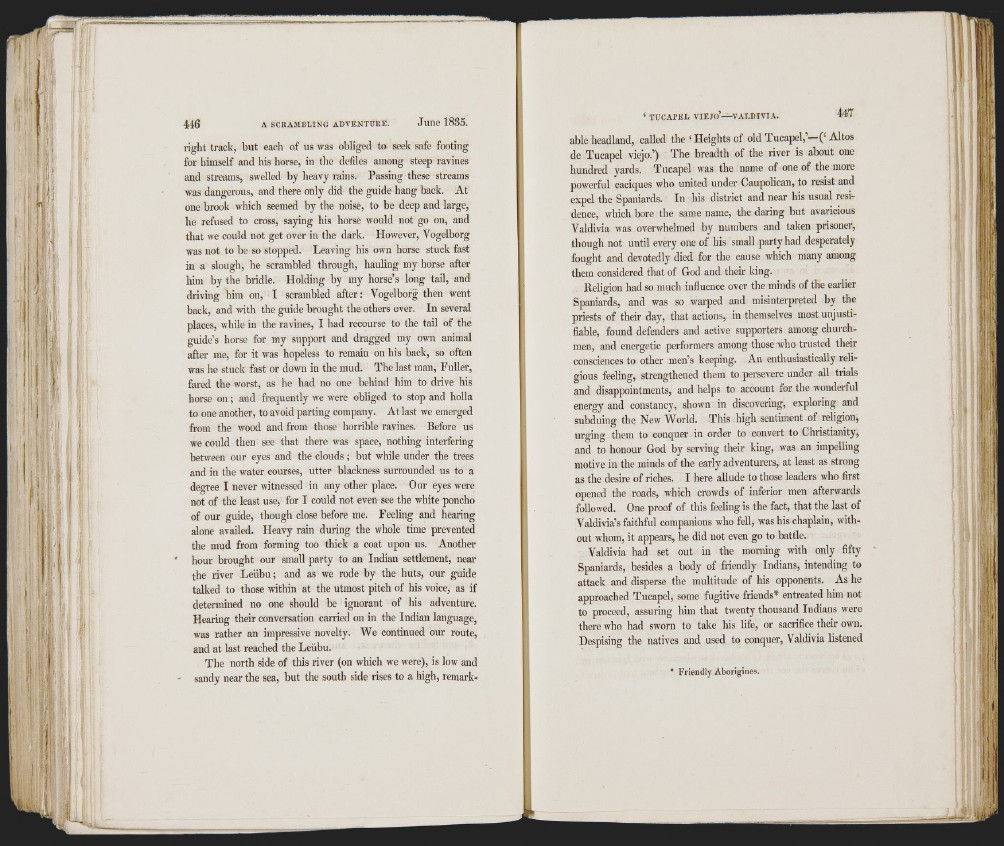
' -1 i !
' ■ li'.
0 r i
..I i
:¡íl
i't
i?]'
Tí' 1
?i:
, , E I
■f h ;
t ' V
i ¡ )ii
i'l .
:
! #
if, (
446 A SCRAMBLING ADVENTURE. June 1835.
right track, but each of us was obliged to seek safe footing
for himself and his horse, in the defiles among steep ravines
and streams, swelled by heavy rains. Passing these streams
was dangerous, and there only did the guide hang back. At
one brook which seemed by the noise, to be deep and large,
he refused to cross, saying his horse would not go on, and
that we could not get over in the dark. However, Vogelborg
was not to be so stopped. Leaving his own horse stuck fast
in a slough, he scrambled through, hauling my horse after
him by the bridle. Holding by my horse’s long tail, and
driving him on, I scrambled after: Vogelborg then went
back, and with the guide brought the others over. In several
places, while in the ravines, I had recourse to the tail of the
guide’s horse for my support and dragged my own animal
after me, for it was hopeless to remain on his back, so often
was he stuck fast or down in the mud. The last man. Fuller,
fared the worst, as he had no one behind him to drive his
horse o n ; and frequently we were obliged to stop and holla
to one another, to avoid parting company. At last we emerged
from the wood and from those horrible ravines. Before us
we could then see that there was space, nothing interfering
between our eyes and the clouds ; but while under the trees
and in the water courses, utter blackness surrounded us to a
degree I never witnessed in any other place. Our eyes were
not of the least use, for I could not even see the white poncho
of our guide, though close before me. Feeling and hearing
alone availed. Heavy rain during the whole time prevented
the mud from forming too thick a coat upon us. Another
hour brought our smaU party to an Indian settlement, near
the river Leübu; and as we rode by the huts, our guide
talked to those within at the utmost pitch of his voice, as if
determined no one should be ignorant of his adventure.
Hearing their conversation carried on in the Indian language,
was rather an impressive novelty. We continued our route,
and at last reached the Leübu.
The north side of this river (on which we were), is low and
sandy near the sea, but the south .side rises to a high, remark-
‘ TUCAPE L V IE J o ’ V ALDIVIA. 447
able lieadland, called the ‘Heights of old Tucapel,’—(' Altos
de Tucapel viejo.’) The breadth of the river is about one
hundred yards. 'Tucapel was the name of one of the more
powerful caciques who united under Caupolican, to resist and
expel the Spaniards. In his district and near his usual residence,
which bore tbe same name, the daring but avaricious
Valdivia was overwhelmed by numbers and taken prisoner,
though not until every one of his small party had desperately
fought and devotedly died for the cause wWch many among
them considered that of God and their king.
Religion had so much influence over the minds of the earlier
Spaniards, and was so warped and misinterpreted by the
priests of their day, that actions, in themselves most unjustifiable,
found defenders and active supporters among churchmen,
and energetic performers among those who trusted their
consciences to other men’s keeping. An enthusiastically religious
feeling, strengthened them to persevere under all trials
and disappointments, and helps to account for the wonderful
energy and constancy, shown in discovering, exploring and
subduing the New World. This high sentiment of religion,
urging them to conquer in order to convert to Christianity,
and to honour God by serving their king, was an impelling
motive in the minds of the early adventurers, at least as strong
as the desire of riches. I here allude to those leaders who first
opened the roads, which crowds of inferior men afterwards
followed. One proof of this feeling is the fact, that the last of
Valdivia’s faithful companions who fell, was his chaplain, without
whom, it appears, he did not even go to battle.
Valdivia had set out in the morning with only fifty
Spaniards, besides a body of friendly Indians, intending to
attack and disperse the multitude of his opponents. As he
approached Tucapel, some fugitive friends* entreated him not
to proceed, assuring him that twenty thousand Indians were
there who had sworn to take his life, or sacrifice their own.
Despising the natives and used to conquer, Valdivia listened
* Friendly Aborigines.
I '
n
ià
iii
J
11I 1 i t i
l i $
M i l
ji ri
‘J 11
M
1 L;
Í I 15
! r
'H
]l
i'i
■ 1 ; l l
I